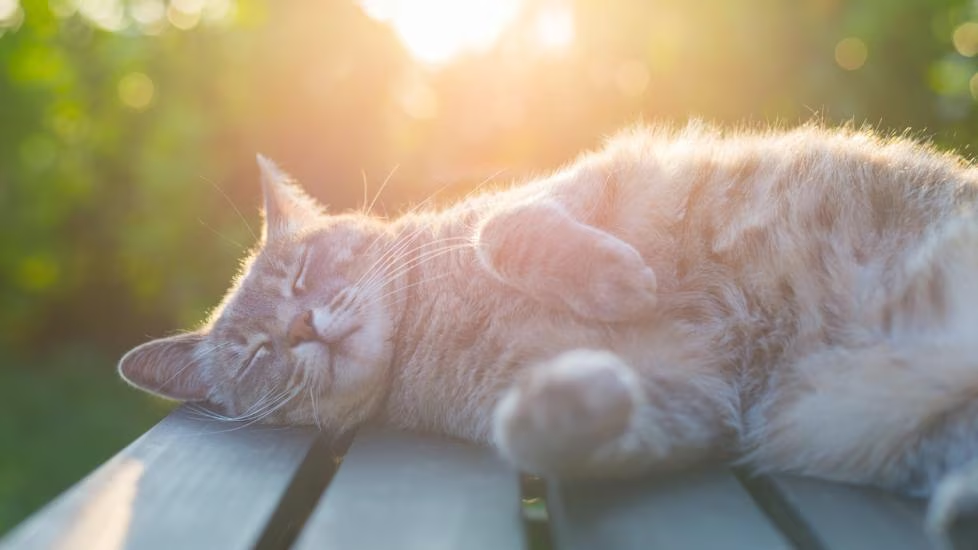Yes, cats can get sunburned, although it’s less common than in humans. While cats have fur to provide some protection from the sun’s harmful rays, certain factors can make them more susceptible to sunburn. It’s important for cat owners to be aware of the risks and take preventive measures to keep their furry friends safe from overexposure to the sun.
Why Can Cats Get Sunburned?
Sunburn in cats typically occurs due to prolonged exposure to the sun’s ultraviolet (UV) rays, which can damage the skin. Cats with lighter-colored fur, thin coats, or hairless breeds are at higher risk, as their skin has less protection against UV radiation. Additionally, cats that love lounging in sunny spots, especially near windows, are more likely to experience sunburn if they don’t have adequate shade or protection.
Factors that Increase the Risk of Sunburn in Cats:
- Light-colored fur and skin:
Cats with white or light-colored fur are more prone to sunburn than those with darker coats. Their skin is less pigmented, meaning it has less natural protection from UV rays. - Hairless breeds:
Hairless breeds like the Sphynx or Peterbald are especially vulnerable because they lack fur to block UV radiation, exposing their skin directly to the sun. - Thin or short coats:
Cats with thin or short coats, even if they aren’t hairless, may have less protection from the sun, making them more susceptible to sunburn. - Indoor/outdoor cats:
Cats that spend a lot of time outside or near sunny windows are at greater risk of sunburn due to prolonged exposure to direct sunlight. - Previous sun damage or skin conditions:
Cats with a history of skin issues or those that have been sunburned before may be more sensitive to the effects of UV rays.
Signs of Sunburn in Cats
Just like in humans, sunburn in cats can be painful and damaging to the skin. If you think your cat may have been exposed to too much sun, keep an eye out for these signs:
- Red, inflamed skin:
One of the first signs of sunburn is redness and swelling on areas of the skin that have been exposed to the sun. The skin may appear irritated, warm to the touch, and tender. - Peeling or flaking skin:
After the initial redness, the skin may begin to peel or flake as it heals from the sun damage. - Blisters or sores:
Severe sunburns can cause blisters, which may break open and become infected if not treated properly. - Hair loss in affected areas:
Sunburned areas may result in hair loss, especially in cats with thin coats or hairless breeds. - Behavioral changes:
Cats with sunburn may show signs of discomfort, such as licking or biting the affected area, hiding more than usual, or becoming unusually sensitive to touch. - Pain and sensitivity:
Your cat may appear more sensitive when you touch their skin, and they may avoid areas that are sunburned.
How to Treat Sunburn in Cats
If your cat shows signs of sunburn, it’s important to take action quickly to minimize further damage and help them heal:
- Keep them out of the sun:
The first step in treating a sunburn is to prevent further exposure to the sun. Bring your cat indoors, away from sunny windows and areas where they are exposed to UV rays. - Cool compresses:
Apply a cool, damp compress to the sunburned areas to help soothe the skin and reduce inflammation. Be sure to use a soft cloth, and avoid applying ice directly to the skin. - Topical treatments:
There are pet-safe lotions and creams designed to soothe irritated skin. Make sure to choose one that is specifically formulated for pets, as human products can contain ingredients harmful to cats. Aloe vera gel is a popular option, but always consult with your vet before using it. - Avoid scratching or licking:
Cats will often try to lick or scratch sunburned areas. This can delay healing and potentially cause infection. Consider using a pet cone (Elizabethan collar) to prevent them from irritating the skin further. - Monitor for infection:
Keep an eye on the sunburned areas for signs of infection, such as pus, increased redness, or swelling. If you notice any of these signs, it’s important to take your cat to the vet for further treatment.
How to Prevent Sunburn in Cats
Prevention is the best way to protect your cat from the harmful effects of the sun. Here are some tips to keep your cat safe:
- Limit sun exposure:
Try to limit your cat’s exposure to the sun, especially during peak hours (10 a.m. to 4 p.m.). If your cat enjoys sitting in sunny spots, try to encourage them to move to a shaded area or create shaded spots for them to enjoy. - Use sun-protective clothing:
If you have a hairless cat or one with thin fur, consider using a cat-safe sunscreen or clothing to cover vulnerable areas of the body. There are special clothing and sun-blocking fabrics designed for pets to provide extra protection. - Provide plenty of shade:
Ensure that your cat has access to shady areas when they are outside, and create a cool, comfortable indoor space for them to retreat to. - Apply pet-safe sunscreen:
If your cat is particularly prone to sunburn, you can apply a pet-safe sunscreen to areas like their ears, nose, and belly—especially if they have light-colored skin. Be sure to choose a sunscreen specifically formulated for pets, as human sunscreens can contain toxic ingredients like zinc oxide. - Regular vet checkups:
If your cat is at higher risk for sunburn, such as those with light-colored fur or hairless breeds, make sure to schedule regular vet checkups. Your vet can help you monitor your cat’s skin health and advise you on the best preventative care.
When to See a Veterinarian
If your cat experiences severe sunburn, or if you notice signs of infection, excessive pain, or blisters, it’s important to consult your veterinarian. A vet can assess the damage and provide the necessary treatment, such as antibiotics for infections or pain relief if your cat is in discomfort.
Conclusion
Yes, cats can get sunburned, and it’s important for owners to take precautions to protect their feline friends from the harmful effects of UV rays. By limiting sun exposure, using pet-safe sunscreen, and keeping an eye out for signs of sunburn, you can help ensure that your cat stays safe and comfortable. If your cat does experience sunburn, prompt treatment is key to aiding recovery and preventing complications. Always consult your veterinarian for advice on the best ways to protect and care for your cat’s skin health.

